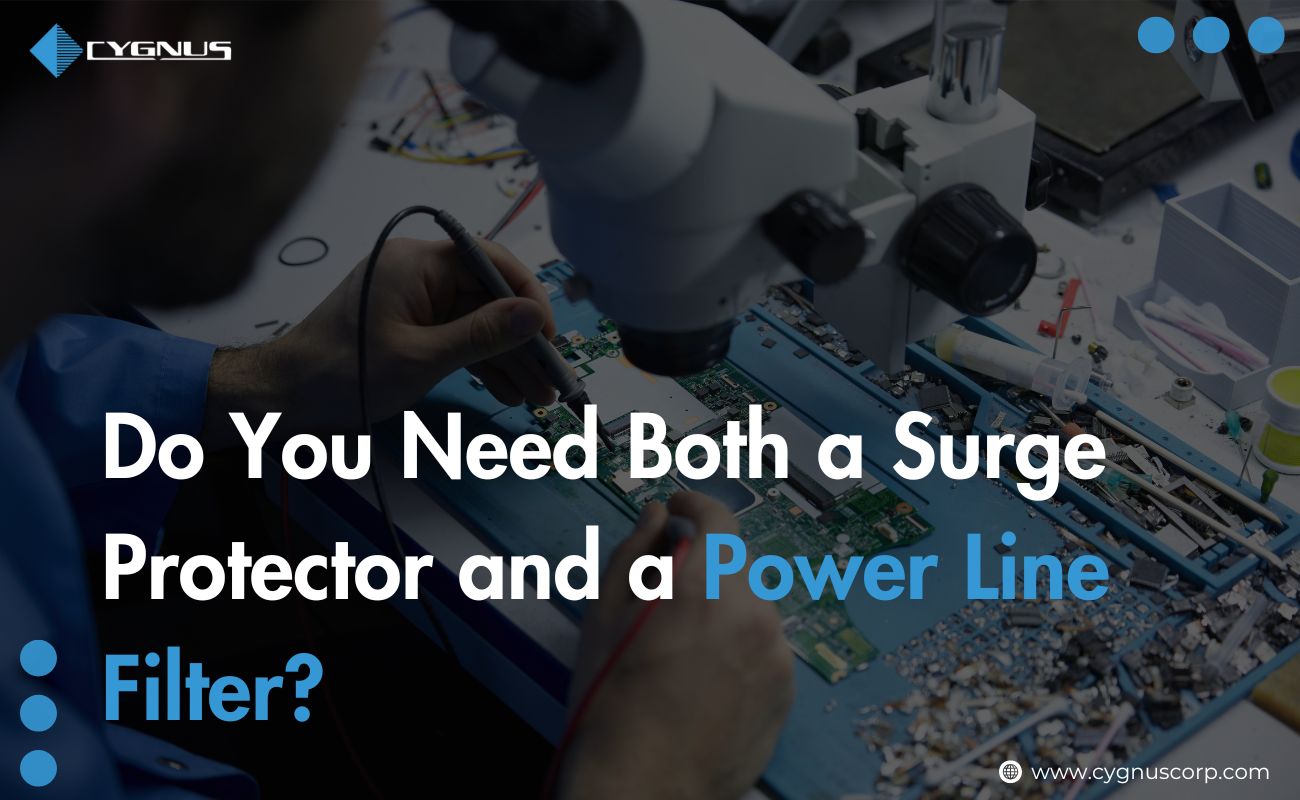Most setups benefit from using both devices. A surge protector shields your equipment from sudden high-voltage spikes (like lightning or grid switching), while a power line filter cleans electrical noise (EMI/RFI) that can cause malfunctions or distorted signals. For medical devices, communication systems, audio/video equipment, industrial automation, and sensitive electronics, combining both offers the strongest and most reliable protection.
Why Surge Protectors and Power Line Filters Are Not the Same?
Even though people often confuse the two, a surge protector and a power line filter do completely different jobs. Understanding their roles makes it easier to decide whether you need one or both.
What a Surge Protector Actually Does?
A surge protector is designed to stop sudden voltage spikes before they reach your equipment.
It protects against:
- Lightning strikes
- Grid switching
- Faulty wiring surges
- Overloads from large appliances
How it works:
- Uses components like MOVs (Metal Oxide Varistors), TVS diodes, or Surge Protection Devices (SPD)
- Redirects excess voltage safely to the ground
- Prevents burnt circuits, dead power supplies, or irreversible equipment damage
Important:
A surge protector does not filter electrical noise and does not stabilize your power.
Perfect for:
- Laptops, desktops
- TVs, routers, modems
- Office equipment
- Home appliances
What a Power Line Filter Does
A power line filter is designed to reduce electrical noise so your equipment gets clean, stable power.
It removes:
- EMI (Electromagnetic Interference)
- RFI (Radio Frequency Interference)
- High-frequency noise on power lines
- Interference caused by motors, industrial machines, and switching power supplies
Why it matters:
- Prevents data errors
- Eliminates buzzing or hum
- Stops image distortion in monitors
- Keeps medical and communication equipment stable
Perfect for:
- Medical devices
- Lab/test equipment
- Audio/video gear
- Telecom equipment
- Industrial automation systems
Important:
A power line filter does not protect against voltage spikes or lightning surges.
Do You Really Need Both? (Short Answer: Usually, Yes)
Using both a surge protector and a power line filter ensures complete power protection — for both sudden spikes and continuous noise.
Here’s when you do (and don’t) need both.
Use Both When Your Equipment Is Sensitive:
If your work depends on accuracy, stable signals, precise readings, or uninterrupted operation, you need both.
Examples include:
Medical Machinery
- Patient monitors
- Diagnostic imaging devices
- Lab analyzers
These devices require clean power and cannot risk surge damage.
Audio/Video & Studio Gear
- Sound mixers
- Recording equipment
- High-end cameras
- Dirty power = hum, hiss, distortion
- Surges = expensive damage
Industrial Automation
- PLCs
- Sensors
- CNC machines
- Robotics
Noise causes malfunction; surges cause downtime.
Networking & Communication Systems:
- Servers
- Routers
- Base stations
- IoT hubs
Filters protect data integrity; surge protectors prevent outages.
In all these scenarios, filters + surge protection = maximum uptime and accuracy.
When a Surge Protector Alone Is Enough
Use only a surge protector if you’re powering:
- Desktop PCs
- TVs
- Printers
- Small office devices
- Standard home appliances
These don’t require noise filtration unless your environment has heavy interference.
When a Power Line Filter Alone Is Enough
Rare, but possible when:
- The equipment is already behind a high-quality UPS or voltage stabilizer
- Electrical noise is the primary issue
- The environment has minimal surge risks
Example:
Studio equipment inside a controlled room connected to a regulated UPS.
Real-World Examples Where Combining Both Matters
Medical Devices
Medical equipment must operate consistently and accurately.
A power line filter ensures stable signals.
A surge protector prevents catastrophic damage.
Example:
A patient monitor may show false readings if EMI enters the system — even if there’s no surge.
Also Read: Power Line Filters vs. Surge Protectors: What’s the Difference?
Audio/Video & Broadcasting
Professionals often experience:
- Buzzing noises
- Flickers
- Distorted screens
- Recording interference
A power line filter eliminates noise, while a surge protector keeps equipment safe from sudden spikes.
Industrial Automation & Robotics
Factories and industrial floors generate heavy noise from:
- Motors
- Inverters
- Compressors
- Switching relays
This affects sensors, PLCs, and control systems, making a combination setup essential.
Networking & Communication Systems:
Communication drops, data errors, and packet loss often come from power noise.
A filter stabilizes signals.
A surge protector shields the entire network from voltage spikes.
What Happens If You Don’t Use Both?
Without a Surge Protector
You risk:
- Fried power supplies
- Burnt wiring
- Destroyed PCBs
- Permanent equipment failure
And worst of all — no warning signs.
Without a Power Line Filter?
You may experience:
- Audio hum
- Video flicker
- Data corruption
- Sensor misreadings
- Equipment malfunction in medical or industrial environments
A surge protector can’t fix noise — only a filter can.
How to Choose the Right Surge Protector and Power Line Filter?
Choosing a Surge Protector
Look for:
- High joule rating (more joules = better protection)
- UL/CSA certification
- Clamping voltage below 500V
- Indicator lights for protection status
- For industrial sites: SPD Type 1/2/3
Choosing a Power Line Filter
Check for:
- EMI/RFI attenuation levels (dB rating)
- Current rating (Amperes)
- Voltage compatibility
- IEC / UL 60939 compliance
- Type of interference (common-mode or differential-mode)
Choose a filter specifically made for your category:
- Medical-grade
- Industrial-grade
- Audio-grade
Final Recommendation:
If you rely on sensitive electronics — whether for medical use, communication, testing, audio/video production, or automation — you should absolutely use both a surge protector and a power line filter.
A surge protector defends your equipment from sudden voltage spikes, while a power line filter ensures your system receives clean and stable power.
Together, they deliver complete, reliable power protection for modern electronic systems.
FAQs
Can a surge protector remove electrical noise?
No. Surge protectors protect against voltage spikes only — they do not filter EMI or RFI noise.
Do power line filters protect against lightning surges?
No. Power line filters remove electrical noise but cannot absorb or redirect lightning-level voltage spikes.
Can I plug a power line filter into a surge protector?
Yes. This is a common setup in hospitals, labs, studios, and industrial facilities.
Is a UPS a replacement for both?
Not completely. A UPS offers battery backup and some filtering, but sensitive equipment still benefits from a dedicated surge protector and EMI/RFI filter.




